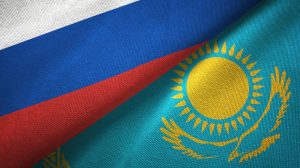Catherine Putz

Russian President Vladimir Putin is expected to visit Kazakhstan on November 9 for an official visit. Putin’s trip marks just his third international foray in 2023, after visits last month to Kyrgyzstan and China, and comes on the heels of French President Emmanuel Macron’s trip through Central Asia, including a stop in Astana.
The Kazakh presidential press service announced on November 6 that Putin would visit this week at the invitation of President Kassym-Jomart Tokayev. The announcement noted that the two leaders planned to hold talks on bilateral issues and their strategic partnership. The two presidents will also participate, virtually, in the 19th Russia-Kazakhstan Interregional Cooperation Forum that will be held in the city of Kostanay in northern Kazakhstan.
In comments to the media on November 7 after the Kremlin confirmed the meeting, spokesman Dmitry Peskov pushed back on the suggestion that the visit was related to the recent overtures by Europe to Kazakhstan. During Macron’s visit to Astana last week, the French and Kazakh sides signed a declaration of intent on cooperation on critical minerals. The French are also interested in Kazakhstan’s uranium, given that the Central Asian country is the world’s largest producer of uranium.
Putin’s visit, Peskov said, “is not associated with any other contacts [made by Kazakhstan]. We will further develop our good neighborliness and cooperation with Kazakhstan.”
Peskov characterized the upcoming visit as “very important from the point of view of the further development of the entire complex of our bilateral relations.” He also commented that there would be a “synchronization of clocks on the entire complex of relations” between Kazakhstan and Russia during the visit.
And relations between Kazakhstan and Russia are certainly complex. The two countries share a long history together within the Soviet Union, and in the 30 years since its collapse have remained closely tied together by social, political, military, and economic bonds. They sit side-by-side in a variety of regional groupings, from the Commonwealth of Independent States (CIS) and the Collective Security Treaty Organization (CSTO) to the Shanghai Cooperation Organization (SCO), which also includes China.
At the same time, Kazakhstan has enshrined as its guiding foreign policy light the phrase “multi-vector,” which enables it, in the simplest terms, to play with everyone on the playground. But Russia’s relations with Kazakhstan have the weight of history behind them and the depth of ties – across many sectors – is nigh impossible to escape.
Kazakhstan, which shares the world’s longest continuous international border with Russia, is in a customs union with Moscow, via the Eurasian Economic Union (EAEU), which has served to complicate efforts to impede “parallel imports” that circumvent international sanctions on Russia. While on the one hand, Tokayev has promised Western leaders that Kazakhstan would not help Russia circumvent sanctions, as Rahimbek Abdrahmanov and Kamshat Zhumagulova noted in a recent article, this is difficult to square with the country’s concurrent pledges to pursue comprehensive cooperation with Russia.
Kazakh Deputy Prime Minister Serik Zhumangarin in comments on November 7 tried to maneuver away from the clouds that follow Putin, but any mention of Russia and trade in the same sentence will invariably summon questions about sanctions evasion.
“What room is there for politics in this context?” he said. “Our agenda is centered on economic and trade relations. Experts and leaders of the regions are arriving to ink agreements focused on trade across the regions. This is clearly in the interest of both nations.”
“The economy always comes first; politics come later,” he said.
As Kazakhstan continues to walk the tightrope between Russia and the West, visits such as Putin’s upcoming trip will be watched carefully.
No comments:
Post a Comment